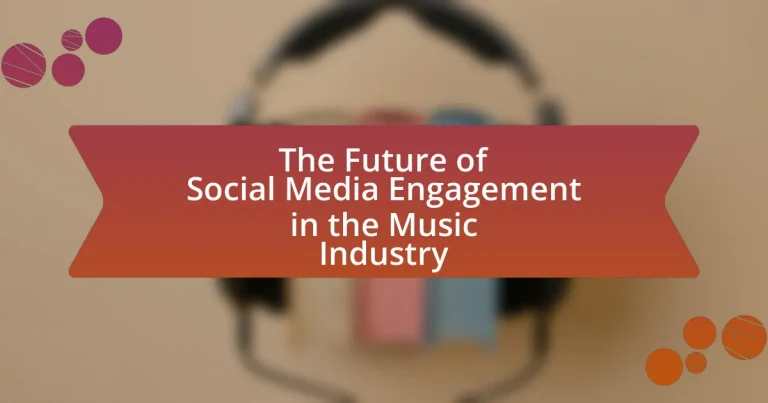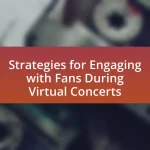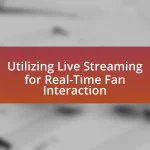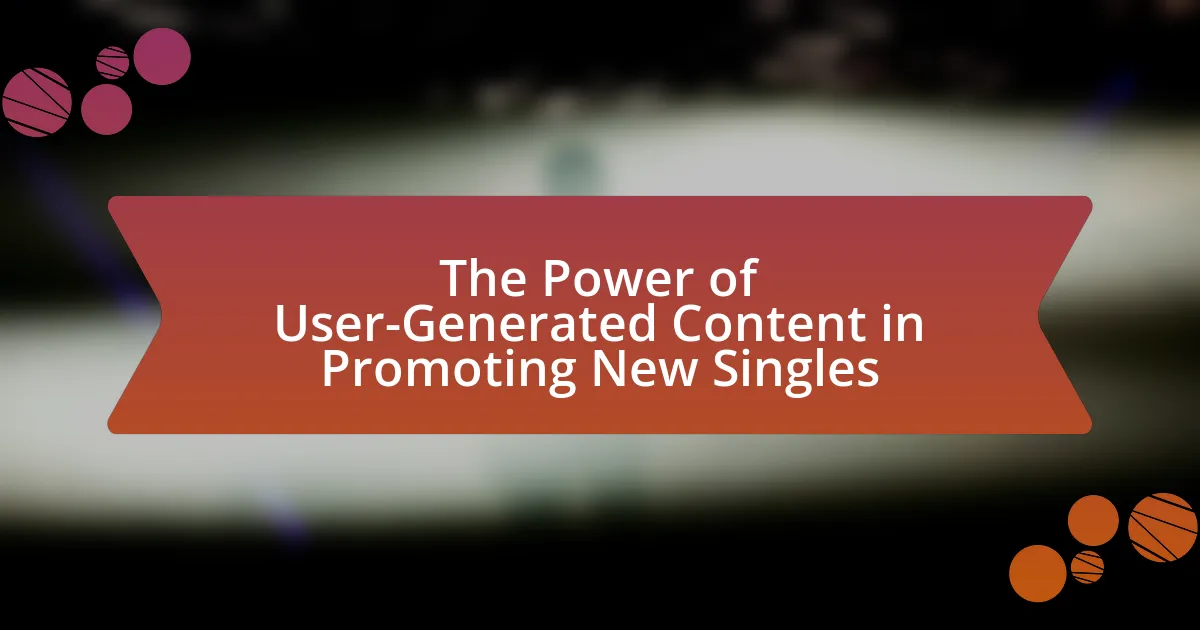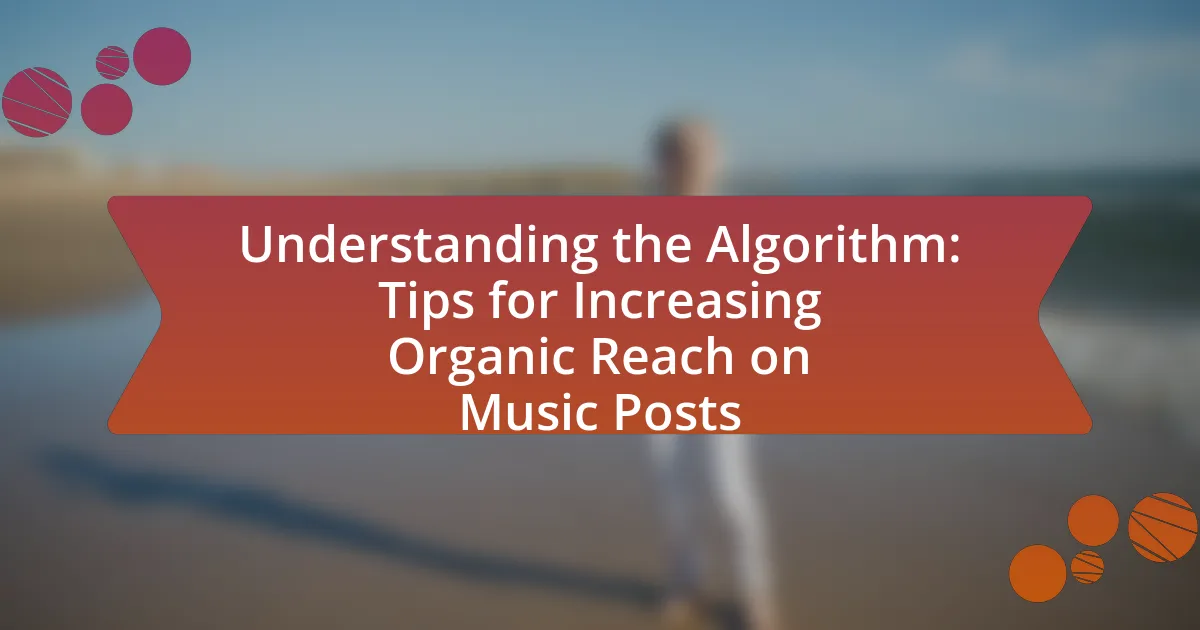The article focuses on the future of social media engagement in the music industry, highlighting the increasing importance of personalized content and interactive experiences. It discusses how platforms like TikTok, Instagram, and Spotify are reshaping artist-fan interactions, with a significant percentage of music consumers engaging with artists on social media. Key trends such as the rise of short-form video content, live streaming, and the integration of augmented and virtual reality are explored, along with the role of algorithms in music discovery. Additionally, the article addresses the challenges artists face in maintaining engagement, the impact of negative interactions, and the legal considerations surrounding social media use in the music industry.
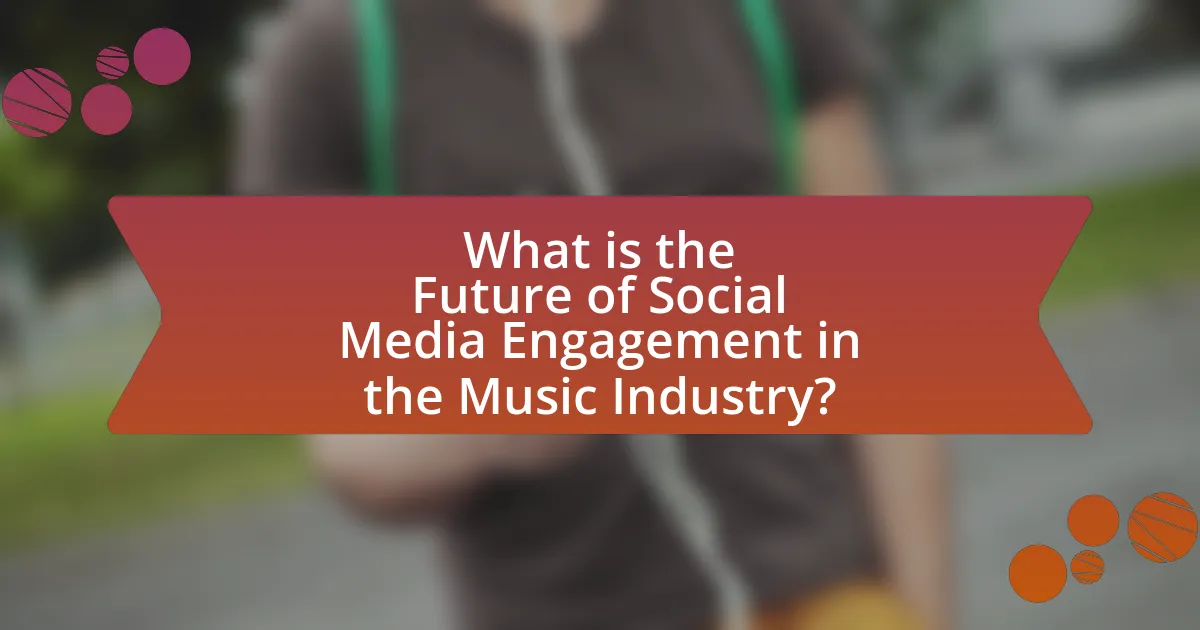
What is the Future of Social Media Engagement in the Music Industry?
The future of social media engagement in the music industry will increasingly revolve around personalized content and interactive experiences. As platforms like TikTok and Instagram continue to dominate, artists will leverage these channels to create tailored content that resonates with specific audiences, enhancing fan engagement. According to a report by the International Federation of the Phonographic Industry (IFPI), 70% of music consumers engage with artists on social media, indicating a strong demand for direct interaction. Additionally, advancements in technology, such as augmented reality (AR) and virtual reality (VR), will enable immersive experiences, allowing fans to participate in live events and exclusive content from their homes. This shift towards more engaging and personalized interactions will redefine how artists connect with their audiences, making social media a crucial tool for marketing and fan loyalty in the music industry.
How is social media currently influencing the music industry?
Social media is currently influencing the music industry by enabling artists to connect directly with fans, promoting music through viral trends, and facilitating real-time feedback. Platforms like TikTok have become essential for music discovery, with songs often gaining popularity through user-generated content and challenges. For instance, a study by the University of Southern California found that tracks featured in TikTok videos can see a 1,000% increase in streams on platforms like Spotify. Additionally, social media allows artists to build their brand and engage with audiences, leading to increased ticket sales and merchandise revenue. This direct interaction has transformed traditional marketing strategies, making social media a critical component of an artist’s promotional efforts.
What platforms are most impactful for music engagement?
The most impactful platforms for music engagement are Spotify, YouTube, and TikTok. Spotify leads with over 500 million users, providing personalized playlists and algorithm-driven recommendations that enhance listener engagement. YouTube, with over 2 billion monthly users, serves as a primary platform for music videos and user-generated content, fostering community interaction through comments and shares. TikTok has rapidly gained influence, with its short-form video format driving viral music trends and challenges, significantly impacting song popularity and artist visibility. These platforms collectively shape how audiences discover, share, and interact with music, demonstrating their critical role in the music industry’s engagement landscape.
How do artists utilize social media for promotion?
Artists utilize social media for promotion by creating engaging content that showcases their music, personality, and brand. This approach allows them to reach a wider audience, interact with fans, and build a community around their work. For instance, platforms like Instagram and TikTok enable artists to share snippets of their songs, behind-the-scenes footage, and personal stories, which can lead to increased visibility and fan engagement. According to a 2021 report by the International Federation of the Phonographic Industry, 75% of artists reported that social media significantly contributed to their promotional efforts, highlighting its effectiveness in the music industry.
What trends are shaping the future of social media engagement in music?
The future of social media engagement in music is being shaped by trends such as the rise of short-form video content, increased use of live streaming, and the integration of augmented reality (AR) experiences. Short-form video platforms like TikTok have become essential for music promotion, with 67% of users discovering new music through the app, according to a 2021 report by the Recording Industry Association of America. Live streaming has gained traction, especially during the pandemic, with platforms like Instagram Live and Twitch allowing artists to connect with fans in real-time, fostering a sense of community. Additionally, AR features in apps like Snapchat and Instagram are enhancing fan engagement by allowing users to interact with music in immersive ways, which can lead to increased sharing and virality. These trends indicate a shift towards more interactive and visually engaging forms of music promotion and fan interaction.
How is technology evolving to enhance music engagement on social media?
Technology is evolving to enhance music engagement on social media through the integration of advanced algorithms, augmented reality, and interactive features. Social media platforms are increasingly utilizing machine learning algorithms to personalize music recommendations, thereby increasing user engagement by suggesting songs and artists based on individual listening habits. For instance, Spotify’s Discover Weekly playlist uses algorithms to curate personalized music selections, resulting in a 40% increase in user engagement according to Spotify’s internal data.
Additionally, augmented reality features, such as those found in TikTok and Instagram, allow users to create immersive music experiences by overlaying visual effects on videos, which enhances user interaction with music content. This has led to a significant rise in user-generated content, with TikTok reporting that 70% of users engage with music-related content on the platform.
Furthermore, interactive features like live streaming and virtual concerts have gained popularity, allowing artists to connect with fans in real-time. Platforms like Facebook and Instagram have facilitated live performances, which saw a 200% increase in viewership during the pandemic, demonstrating the effectiveness of these technologies in fostering music engagement.
What role do algorithms play in music discovery on social media?
Algorithms play a crucial role in music discovery on social media by personalizing content recommendations based on user behavior and preferences. These algorithms analyze data such as listening history, likes, shares, and interactions to curate playlists and suggest new artists, thereby enhancing user engagement. For instance, platforms like Spotify and TikTok utilize machine learning algorithms to identify trends and predict which songs will resonate with specific audiences, leading to increased visibility for emerging artists. Research indicates that over 60% of users discover new music through algorithm-driven recommendations, highlighting the effectiveness of these systems in shaping music consumption patterns.
Why is social media engagement crucial for artists and labels?
Social media engagement is crucial for artists and labels because it directly influences their visibility and connection with audiences. Engaging with fans on platforms like Instagram, Twitter, and TikTok allows artists to build a loyal following, which is essential for promoting new music and tours. According to a 2021 report by the International Federation of the Phonographic Industry, 75% of music consumers discover new artists through social media. This statistic underscores the importance of active engagement in reaching potential listeners and fostering a community around their work. Additionally, social media provides artists and labels with real-time feedback, enabling them to adapt their strategies and content to better resonate with their audience.
How does engagement affect an artist’s career trajectory?
Engagement significantly influences an artist’s career trajectory by enhancing visibility and fostering a loyal fanbase. When artists actively interact with their audience through social media platforms, they increase their chances of reaching a wider audience, as engagement metrics such as likes, shares, and comments can lead to algorithmic boosts in visibility. For instance, a study by the University of Southern California found that artists with higher engagement rates on platforms like Instagram and Twitter tend to have increased streaming numbers and concert attendance, demonstrating a direct correlation between social media engagement and commercial success. This engagement not only helps in building a community around the artist but also attracts industry opportunities such as collaborations, sponsorships, and media coverage, further propelling their career forward.
What metrics are used to measure social media engagement success?
Metrics used to measure social media engagement success include likes, shares, comments, and follower growth. These metrics provide quantitative data on how users interact with content, indicating the level of audience interest and involvement. For instance, a study by HubSpot found that posts with higher engagement rates, such as likes and shares, lead to increased visibility and reach, demonstrating their importance in assessing social media performance. Additionally, tracking engagement rates relative to total followers can help gauge the effectiveness of content strategies in the music industry.
How can artists adapt to changes in social media engagement?
Artists can adapt to changes in social media engagement by diversifying their content strategies and leveraging emerging platforms. For instance, as user preferences shift towards short-form video content, artists can create engaging clips on platforms like TikTok and Instagram Reels to reach wider audiences. Additionally, utilizing data analytics tools allows artists to track engagement metrics, enabling them to tailor their content to audience preferences effectively. According to a 2022 report by Hootsuite, 73% of marketers believe that video content is the most effective for engagement, highlighting the importance of adapting to this trend. By staying informed about platform algorithms and audience behavior, artists can maintain relevance and foster deeper connections with their fans.
What strategies can artists implement for effective social media engagement?
Artists can implement strategies such as consistent content creation, audience interaction, and leveraging analytics for effective social media engagement. Consistent content creation involves regularly posting high-quality visuals, music snippets, and behind-the-scenes content to maintain audience interest. Audience interaction includes responding to comments, hosting live Q&A sessions, and encouraging user-generated content, which fosters a sense of community. Leveraging analytics allows artists to understand their audience’s preferences and optimize their content accordingly, leading to increased engagement. According to a study by Hootsuite, brands that engage with their audience on social media see a 20-40% increase in customer loyalty, highlighting the importance of these strategies for artists.
How can artists create authentic connections with their audience?
Artists can create authentic connections with their audience by engaging in genuine interactions and sharing personal stories. This approach fosters relatability and trust, which are essential for building a loyal fan base. Research indicates that 70% of consumers feel more connected to brands that share their values, highlighting the importance of authenticity in communication. By utilizing social media platforms to showcase behind-the-scenes content, respond to fan messages, and express vulnerability, artists can deepen their emotional connection with their audience, ultimately enhancing their engagement and support.
What content types are most effective for engaging music fans?
Video content is the most effective type for engaging music fans. Research indicates that music videos, live streams, and behind-the-scenes footage significantly enhance fan interaction and retention. For instance, a study by the International Federation of the Phonographic Industry (IFPI) found that 70% of music fans engage more with artists who share video content, highlighting the importance of visual storytelling in the music industry. Additionally, platforms like TikTok have demonstrated that short-form video content can lead to viral trends, further solidifying video as a key engagement tool for music fans.
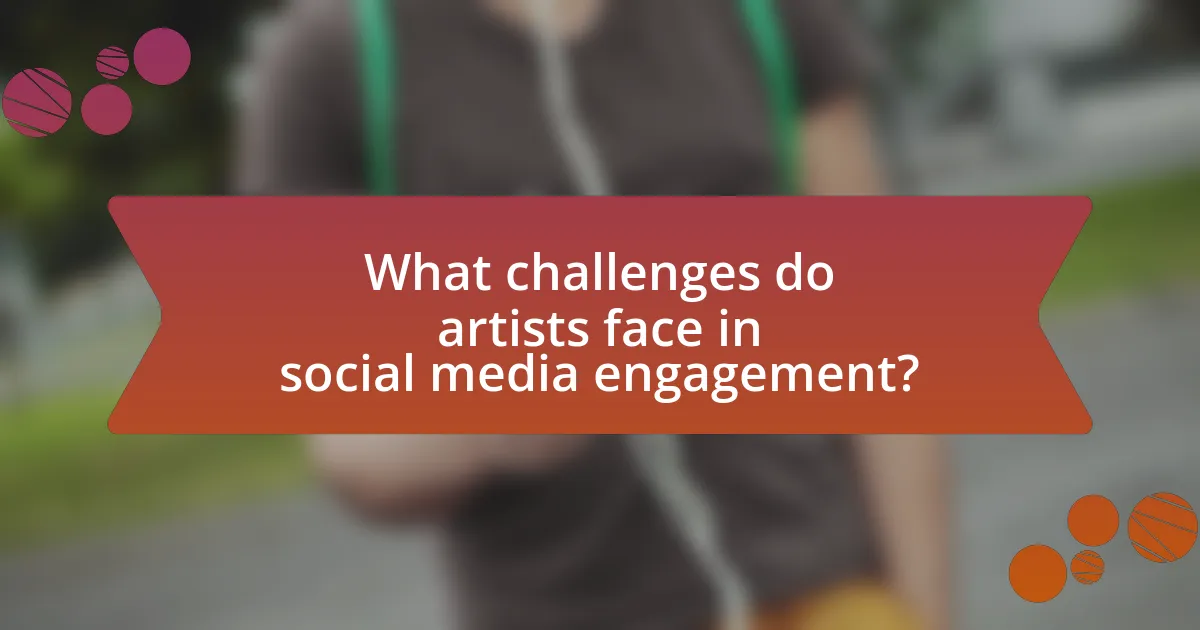
What challenges do artists face in social media engagement?
Artists face several challenges in social media engagement, primarily including algorithm changes, audience saturation, and the pressure to produce consistent content. Algorithm changes on platforms like Instagram and Facebook can limit the visibility of an artist’s posts, making it difficult for them to reach their target audience effectively. Audience saturation occurs when numerous artists compete for attention, leading to decreased engagement rates as followers become overwhelmed with content. Additionally, the pressure to produce consistent and high-quality content can lead to burnout, impacting an artist’s creativity and overall engagement with their audience. These challenges are supported by studies indicating that 70% of artists report feeling overwhelmed by the demands of social media, which can hinder their ability to connect authentically with fans.
How do negative interactions impact artists on social media?
Negative interactions significantly impact artists on social media by affecting their mental health, public perception, and engagement levels. Research indicates that artists often experience anxiety, depression, and decreased self-esteem due to negative comments and cyberbullying, which can hinder their creative output and overall well-being. For instance, a study published in the Journal of Social and Clinical Psychology found that negative feedback on social media can lead to increased feelings of isolation and distress among artists. Furthermore, negative interactions can alter public perception, leading to a decline in fan engagement and support, as artists may withdraw from online platforms to protect their mental health. This withdrawal can result in reduced visibility and opportunities for collaboration, ultimately impacting their career trajectory in the music industry.
What strategies can mitigate backlash or criticism?
To mitigate backlash or criticism in the music industry, artists and organizations should adopt proactive communication strategies. These strategies include transparent engagement with audiences, timely responses to concerns, and the use of social media to clarify misunderstandings. For instance, a study by the Pew Research Center indicates that 64% of social media users believe that transparency from public figures can reduce negative perceptions. Additionally, implementing feedback mechanisms allows for audience input, fostering a sense of community and understanding. By actively listening and addressing issues, the music industry can build trust and reduce the likelihood of backlash.
How can artists handle misinformation or rumors online?
Artists can handle misinformation or rumors online by actively monitoring their digital presence and promptly addressing inaccuracies. This involves utilizing social media platforms to clarify facts, engage with fans, and provide official statements when necessary. For instance, a study by the Pew Research Center indicates that 64% of adults believe social media is a key source of misinformation, highlighting the importance of artists being proactive in their communication strategies. By consistently sharing accurate information and engaging directly with their audience, artists can mitigate the impact of false narratives and maintain their credibility in the music industry.
What are the legal considerations for artists on social media?
Artists on social media must consider copyright laws, defamation risks, and privacy issues. Copyright laws protect original works, meaning artists should ensure they have the rights to any content they share, including music, images, and videos. Defamation risks arise when artists make false statements about others, which can lead to legal action. Privacy issues involve respecting the personal information of fans and collaborators, as sharing such information without consent can result in legal consequences. These considerations are crucial for maintaining a positive online presence and avoiding legal disputes in the music industry.
How do copyright laws affect music sharing on social platforms?
Copyright laws significantly restrict music sharing on social platforms by requiring users to obtain permission from copyright holders before distributing copyrighted material. These laws, such as the Digital Millennium Copyright Act (DMCA) in the United States, impose legal consequences for unauthorized sharing, including potential takedown notices and account suspensions. For instance, platforms like YouTube and Facebook implement content identification systems to detect and manage copyrighted music, which can lead to the removal of videos or posts that violate copyright. This legal framework aims to protect the rights of artists and producers, ensuring they receive compensation for their work while also shaping how users engage with music on social media.
What are the implications of influencer partnerships for artists?
Influencer partnerships significantly enhance artists’ visibility and audience engagement. By collaborating with influencers, artists can tap into established follower bases, leading to increased exposure and potential fan growth. For instance, a study by the Influencer Marketing Hub found that 63% of marketers planned to increase their influencer marketing budgets, indicating a growing recognition of its effectiveness. Additionally, these partnerships can drive streaming numbers and social media interactions, as influencers often create content that resonates with their audience, thereby promoting the artist’s work authentically. This strategic alignment not only boosts an artist’s reach but also fosters a more personal connection with fans, ultimately impacting their career trajectory positively.
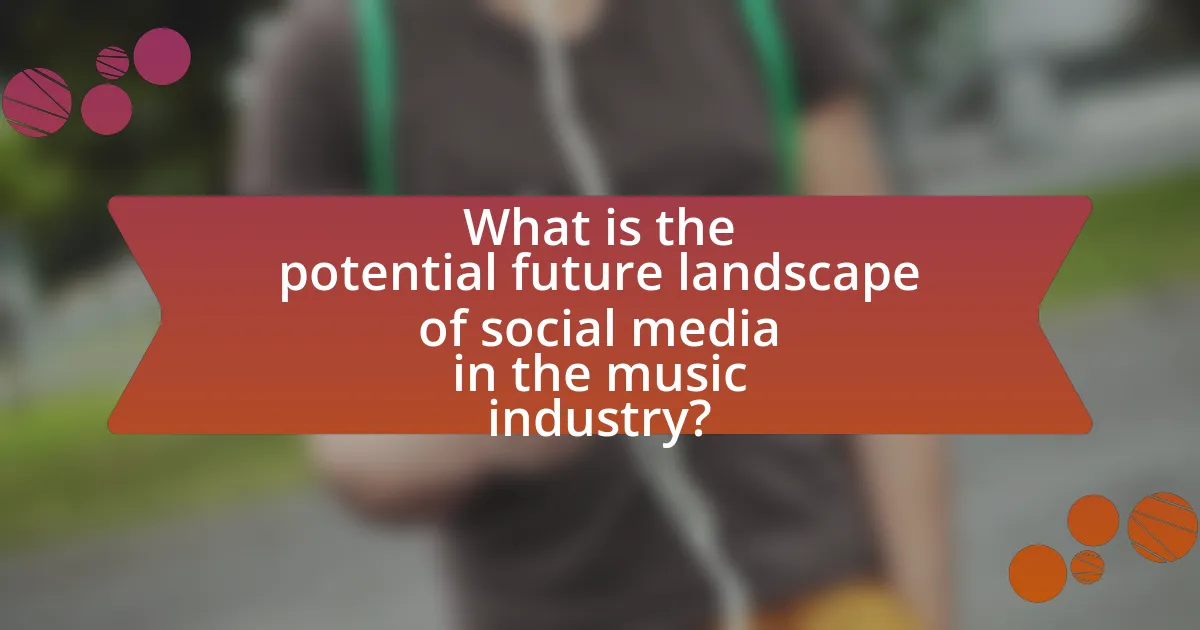
What is the potential future landscape of social media in the music industry?
The potential future landscape of social media in the music industry will likely be characterized by increased integration of immersive technologies, such as virtual reality and augmented reality, enhancing fan engagement. As platforms evolve, artists will utilize these technologies to create interactive experiences, allowing fans to attend virtual concerts or engage in real-time collaborations. For instance, the rise of platforms like TikTok has already demonstrated how short-form video content can drive music discovery and virality, suggesting that future social media will continue to prioritize visual and interactive formats. Additionally, data analytics will play a crucial role, enabling artists and labels to tailor their marketing strategies based on audience preferences and behaviors, thereby optimizing engagement and revenue streams.
How might emerging technologies change music engagement?
Emerging technologies will significantly change music engagement by enhancing interactivity and personalization for listeners. For instance, advancements in artificial intelligence enable music platforms to analyze user preferences and curate personalized playlists, increasing listener satisfaction and retention. Additionally, virtual reality and augmented reality technologies allow fans to experience live performances in immersive environments, creating a more engaging concert experience. According to a report by Deloitte, 80% of consumers are interested in virtual concerts, indicating a strong demand for innovative engagement methods. These technologies not only foster deeper connections between artists and fans but also expand the ways in which music can be experienced and shared.
What role will virtual reality and augmented reality play in music experiences?
Virtual reality (VR) and augmented reality (AR) will significantly enhance music experiences by creating immersive environments that engage audiences in novel ways. These technologies allow users to experience live concerts from remote locations, interact with virtual performers, and explore music-related content in 3D spaces. For instance, platforms like Oculus Venues and WaveXR have already demonstrated how VR can host live performances, enabling fans to attend concerts virtually, which was particularly relevant during the COVID-19 pandemic when physical attendance was restricted. Additionally, AR applications can overlay digital elements onto real-world environments, allowing fans to visualize music videos or album art in their own space, thereby deepening their connection to the music. The integration of VR and AR in music experiences is supported by industry trends, with a report from PwC predicting that the global AR and VR market will reach $1.5 trillion by 2030, indicating a growing investment in these technologies within the entertainment sector.
How could artificial intelligence personalize music engagement?
Artificial intelligence could personalize music engagement by analyzing user data to create tailored playlists and recommendations. AI algorithms assess listening habits, preferences, and even emotional responses to music, enabling platforms to suggest songs that resonate with individual users. For instance, Spotify utilizes machine learning to curate personalized playlists like “Discover Weekly,” which is based on user behavior and preferences, leading to increased user satisfaction and engagement. This data-driven approach enhances the overall music experience by ensuring that users receive content that aligns closely with their tastes and moods.
What best practices should artists follow for future social media engagement?
Artists should prioritize authentic engagement with their audience on social media to enhance future interactions. This involves consistently sharing personal stories, behind-the-scenes content, and responding to fan comments to foster a sense of community. Research indicates that 70% of consumers feel more connected to brands that share their values, highlighting the importance of authenticity in building relationships. Additionally, utilizing analytics tools to track engagement metrics can help artists understand what content resonates most with their audience, allowing for more targeted and effective communication strategies.
How can artists stay ahead of trends in social media engagement?
Artists can stay ahead of trends in social media engagement by actively monitoring platform analytics and audience behavior. By utilizing tools like Instagram Insights or Facebook Analytics, artists can identify which content resonates most with their audience, allowing them to adapt their strategies accordingly. Additionally, engaging with emerging platforms, such as TikTok, which has seen a rapid increase in user engagement, enables artists to tap into new trends early. Research indicates that 63% of marketers plan to increase their investment in social media engagement, highlighting the importance of staying current. Furthermore, collaborating with influencers and participating in viral challenges can enhance visibility and relevance in the ever-evolving social media landscape.
What tools can assist artists in managing their social media presence?
Artists can utilize tools like Hootsuite, Buffer, and Later to effectively manage their social media presence. Hootsuite allows users to schedule posts across multiple platforms, track engagement metrics, and monitor brand mentions, making it easier for artists to maintain a consistent online presence. Buffer offers similar scheduling capabilities along with analytics to assess post performance, which helps artists refine their content strategy. Later specializes in visual content planning, particularly for Instagram, enabling artists to curate their feeds and schedule posts visually. These tools are widely adopted in the industry, with Hootsuite serving over 18 million users and Buffer reporting that 90% of its users see improved engagement after using the platform.
